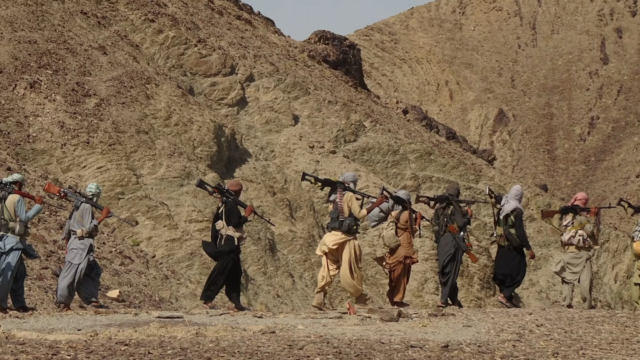
Focus on High-Value Military Targets Emphasizes the TJP’s Link to the TTP
Publication: Terrorism Monitor Volume: 22 Issue: 6
By:

Executive Summary
- The Tehreek-e-Jihad Pakistan’s (TJP) assaults on high-profile military targets reflect a similar attack pattern to the Tehreek-i-Taliban Pakistan’s (TTP), providing additional evidence to the argument that the former is intended to be a front group for the latter. This has contributed to a continual rise in tensions between Afghanistan and Pakistan.
- This distinction provides cover for the Afghan Taliban to officially restrict the TTP, which has been a source of significant strife in Pakistan, while still supporting their cause. Islamabad, on the other hand, firmly believes that the two groups are synonymous and has retaliated in kind.
In the first three months of 2024, the Tehreek-e-Jihad Pakistan (TJP), which only emerged on the scene in February 2023, did not take responsibility for any attack in Pakistan. The last attack claimed by the TJP in 2023 was in Dera Ismail Khan District of Khyber Pakhtunkhwa Province in December, where 23 Pakistani soldiers were killed (Dawn, December 12, 2023). In addition, on November 4, 2023, Pakistani security forces foiled an attack on a Pakistan Air Force training base in Mianwali, Punjab Province. All nine attackers were killed, but the attack still caused damage to three aircraft on the ground. The TJP claimed responsibility for the attempt (Dawn, November 4, 2023).
Attacks or attempts on high-profile military targets are the primary reason some in Pakistan allege that the TJP is merely another name for the Tehreek-i-Taliban Pakistan (TTP) or “Pakistani Taliban,” which has a long history of striking Pakistan’s armed forces. A closer examination of these allegations is necessary.
TTP and TJP Base Attacks
The TTP has a history of high-profile attacks on military installations. In 2009, for example, the TTP launched a deadly attack on Pakistan Army General Headquarters in Rawalpindi (The Nation, October 10, 2009). In 2011, TTP militants stormed Naval Air Station Mehran, the headquarters of Pakistan’s naval aviation branch, in the southern port city of Karachi. 11 Pakistan Navy officials were killed in the assault (Dawn, May 23, 2011). In September 2023, two military checkpoints were attacked by TTP militants in Chitral District in Khyber Pakhtunkhwa Province, near the Pakistan–Afghanistan border. Pakistan’s security forces repulsed the attack, with four Pakistani soldiers and 12 heavily armed attackers killed in the fighting (Al Jazeera, September 7, 2023).
The TJP, however, also carried out high-profile attacks in Pakistan last year, which were reminiscent of the TTP’s (see Terrorism Monitor, August 21, 2023). These include:
- An attack on the Zhob garrison in Balochistan Province, which killed nine Pakistani army soldiers and five TJP attackers (Dawn, July 12, 2023);
- A suicide attack inside Kabal police station in the Swat Area of Khyber Pakhtunkhwa Province, which killed at least a dozen people, including several police officers (Dawn, April 25, 2023); and
- A suicide attack that killed nine paramilitary security personnel in Quetta, the capital of Balochistan Province (Dawn, March 7, 2023).
The TTP is primarily based out of Afghanistan. Following the cross-border attack on military checkpoints in Chitral, Pakistan, from bases in Afghanistan last September (see Terrorism Monitor, March 1), the Afghan Taliban launched a crackdown on TTP militants on their territory. Afghanistan is believed to be pressuring TTP members to relocate away from the country’s border with Pakistan (Samaa TV, September 28, 2023).
Afghanistan and Pakistan’s TTP Policies
There is one reason for the “U-turn” in the Taliban’s TTP policy: Last July’s decree from Afghanistan’s Supreme Leader, Mullah Haibatullah Akhundzada. In this, Akhundzada declared that cross-border attacks against Pakistan were un-Islamic and ordered Afghans not to collaborate with or give donations to the TTP in support of its self-declared jihad against Pakistan. As a result, TTP militants were barred from running donation collection campaigns in Afghanistan (Samaa TV, September 28, 2023). Akhundzada warned that anyone who breaches his order will not receive forgiveness or recognition from the Taliban government in Afghanistan (China Daily, August 12, 2023).
Following the order of Afghanistan’s Supreme Leader, the TTP could no longer freely operate with support from the Taliban. Given this, it seems likely that the rising TJP was intended as little more than a “rebranding” of the TTP to allow the group to continue its war against Pakistan from inside of Afghanistan.
Pakistan has historically been a staunch supporter of the Afghan Taliban. Islamabad played a key role in facilitating talks between the United States and the Taliban before the US withdrawal from Afghanistan in August 2021. After two years of Taliban rule, however, Pakistan has witnessed an increase in terrorist attacks, often coming from militants based on Afghan soil. As a result, in a sweeping statement, Pakistan’s former Caretaker Prime Minister Anwaarul Haq Kakar deplored the alleged involvement of Afghan citizens in suicide attacks inside Pakistan. He also linked the deportation drive of hundreds of thousands of Afghan refugees from Pakistan to the country’s counter-terrorism policy (Dawn, November 8, 2023). This likely prompted Akhundzada’s decree.
Conclusion
Despite the decree from the Taliban’s Supreme Leader, Afghanistan-based TTP militants still attack Pakistan, albeit under the TJP’s “brand.” The Taliban’s leadership is undoubtedly aware of the TJP and is merely saving face by cracking down “only” on the TTP. The Taliban and TTP are close ideologically and have fought for many years to impose a radical version of Islam in their respective countries.
If the TTP believed that shifting its operations to a new group called the TJP would fool Pakistani authorities, however, the “TJP project” failed. Islamabad considers TJP to merely be another face of the TTP. This would be why Pakistan has retaliated for terrorist attacks which killed seven Pakistani soldiers by striking TTP hideouts in Afghanistan. Nevertheless, the strikes have increased tensions between Islamabad and Kabul (Dawn, March 18).



